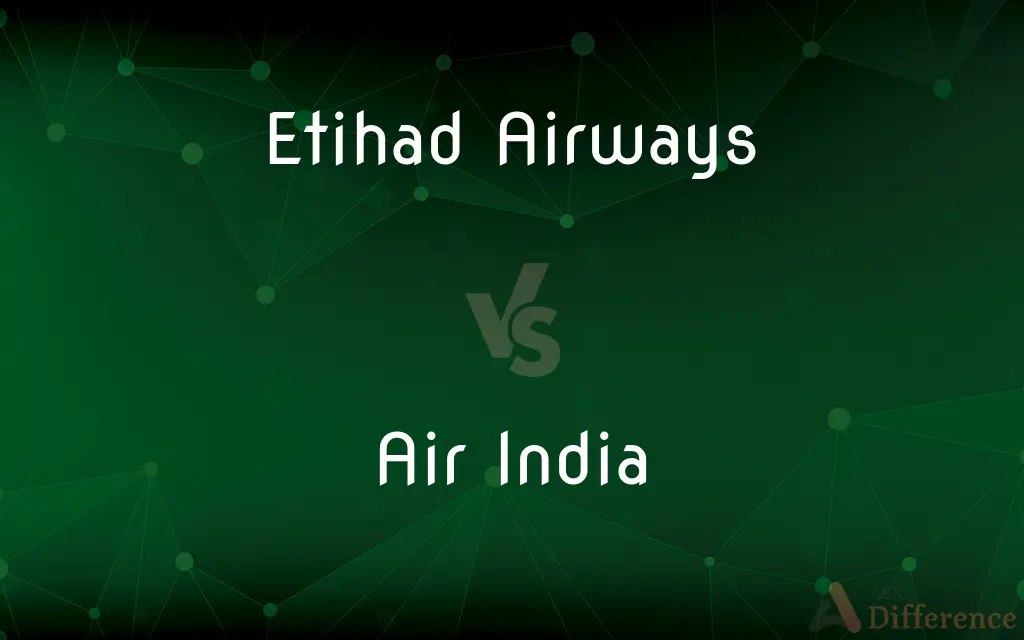Etihad Airways vs. Air India — What's the Difference?
By Fiza Rafique & Urooj Arif — Published on February 21, 2024
Etihad Airways is a UAE-based premium carrier known for its luxury services, while Air India, the flag carrier of India, offers a blend of traditional Indian hospitality and modern aviation services.

Difference Between Etihad Airways and Air India
Table of Contents
ADVERTISEMENT
Key Differences
Etihad Airways, established in 2003, is recognized for its high-end services, including The Residence on its A380 aircraft, which offers a three-room suite with a living room, bedroom, and private bathroom. It caters to a global audience with a focus on luxury and comfort. Air India, with a history dating back to 1932, is known for its extensive network within India and international routes, providing a touch of traditional Indian hospitality.
Etihad's fleet is one of the most modern in the world, emphasizing comfort, efficiency, and sustainability. The airline offers a wide range of classes, from Economy to First Class, with premium services across all tiers. Air India, following its acquisition by Tata Sons, is undergoing modernization and expansion, aiming to enhance its service quality and operational efficiency.
Service-wise, Etihad is acclaimed for its personalized attention, gourmet dining, and superior in-flight entertainment. Air India, on the other hand, prides itself on its warm service, authentic Indian cuisine, and efforts to improve in-flight amenities and comfort.
Frequent flyer programs are another point of comparison. Etihad Airways offers Etihad Guest, providing generous rewards, luxurious perks, and partnerships with other airlines. Air India’s Flying Returns program is designed to reward loyal passengers with benefits and privileges, including upgrades and lounge access.
Both airlines serve as crucial connectors, with Etihad focusing on connecting the East with the West through its Abu Dhabi hub, and Air India leveraging its extensive domestic network to offer seamless connections to international destinations.
ADVERTISEMENT
Comparison Chart
Established
2003
1932
Headquarters
Abu Dhabi, UAE
New Delhi, India
Fleet Modernity
Highly modern, with a focus on luxury and efficiency
Undergoing modernization, with a mix of old and new aircraft
Service Focus
Luxury services, personalized attention
Traditional Indian hospitality, modern aviation services
In-flight Entertainment
Advanced, with wide selection
Improving, with a focus on diverse content
Cuisine
Gourmet dining, international cuisine
Authentic Indian cuisine, international options
Frequent Flyer Program
Etihad Guest
Flying Returns
Network
Global, with a focus on connecting East and West
Extensive domestic network, significant international presence
Class Offerings
Economy to The Residence
Economy to First Class
Operational Focus
Luxury, comfort, sustainability
Connectivity within India, improvement in services
Compare with Definitions
Etihad Airways
Focus on modern fleet.
Etihad’s fleet includes state-of-the-art aircraft for maximum passenger comfort.
Air India
India’s flag carrier.
Air India combines traditional hospitality with modern aviation services.
Etihad Airways
Gourmet dining options.
On Etihad, passengers can enjoy gourmet meals designed by renowned chefs.
Air India
Authentic Indian cuisine.
Passengers on Air India enjoy authentic Indian meals on international flights.
Etihad Airways
UAE-based luxury carrier.
Etihad Airways offers The Residence, setting a new standard in luxury air travel.
Air India
Focus on service improvement.
Following its acquisition, Air India is enhancing its fleet and passenger services.
Etihad Airways
Etihad Guest program.
Etihad Guest rewards travelers with luxurious perks and exclusive benefits.
Air India
Extensive domestic network.
Air India’s vast domestic network makes it a preferred choice for travel within India.
Etihad Airways
Global network.
Etihad connects passengers globally, making Abu Dhabi a key transit hub.
Air India
Flying Returns program.
Air India’s Flying Returns offers rewarding benefits for frequent flyers.
Common Curiosities
How do the in-flight amenities compare between the two airlines?
Etihad provides advanced in-flight entertainment and gourmet dining, while Air India focuses on offering authentic Indian cuisine and is working on improving its in-flight services.
Which airline should I choose for travel within India?
Air India, with its extensive domestic network, is the preferred choice for connectivity within India.
What sets Etihad Airways apart from Air India?
Etihad is known for its luxury services, including The Residence, and focuses on a global network with a modern fleet. Air India offers a blend of traditional hospitality and a wide domestic network.
What are the frequent flyer programs of Etihad and Air India?
Etihad Airways has Etihad Guest, and Air India offers Flying Returns, each providing unique benefits and rewards to its members.
Is there a difference in the target audience of the two airlines?
Etihad targets luxury and business travelers seeking premium services, while Air India caters to a broad audience, including budget and traditional travelers.
How do the culinary experiences differ?
Etihad focuses on international gourmet cuisine, while Air India emphasizes authentic Indian dishes alongside international options.
What luxury options does Etihad offer that Air India does not?
Etihad offers ultra-luxury options like The Residence, which are unmatched by Air India in terms of opulence and exclusivity.
Are both airlines good for international travel?
Yes, both airlines serve international destinations, with Etihad focusing on East-West connections and Air India offering significant international routes alongside its domestic service.
Can I expect modern aircraft on both airlines?
Etihad boasts a highly modern fleet, while Air India is in the process of modernizing its fleet with the addition of newer aircraft.
How have recent changes affected Air India's services?
The acquisition by Tata Sons is expected to lead to significant improvements in Air India’s services, fleet, and operational efficiency, aiming to enhance the overall passenger experience.
Share Your Discovery

Previous Comparison
ATPase vs. ATP Synthase
Next Comparison
Cuvette vs. Test TubeAuthor Spotlight
Written by
Fiza RafiqueFiza Rafique is a skilled content writer at AskDifference.com, where she meticulously refines and enhances written pieces. Drawing from her vast editorial expertise, Fiza ensures clarity, accuracy, and precision in every article. Passionate about language, she continually seeks to elevate the quality of content for readers worldwide.
Co-written by
Urooj ArifUrooj is a skilled content writer at Ask Difference, known for her exceptional ability to simplify complex topics into engaging and informative content. With a passion for research and a flair for clear, concise writing, she consistently delivers articles that resonate with our diverse audience.














































